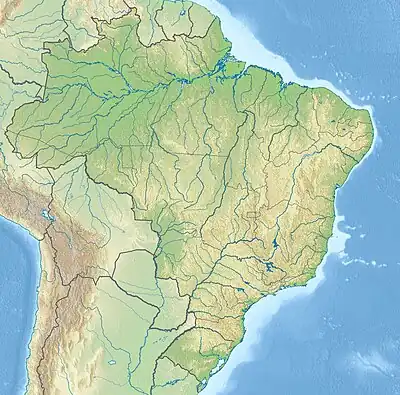| Jacupiranga Mosaic | |
|---|---|
| Mosaico do Jacupiranga | |
IUCN category V (protected landscape/seascape) | |
 Lagamar de Cananeia State Park | |
 | |
| Location | São Paulo state, Southeastern Brazil |
| Coordinates | 24°52′09″S 48°20′59″W / 24.869284°S 48.349828°W |
| Area | 243,885.78 hectares (602,654.9 acres) |
| Designation | Protected area mosaic |
| Created | 21 February 2008 |
The Jacupiranga Mosaic (Portuguese: Mosaico do Jacupiranga) is a protected area mosaic of 14 units, located in the Atlantic Forest biome within the state of São Paulo of southeastern Brazil.
It is centered on the former Jacupiranga State Park.
History
The Jacupiranga Mosaic was created by state law 12.810 of 21 February 2008 with a total area of 243,885.78 hectares (602,654.9 acres), including 14 conservation units and 2 planned Private natural heritage reserves.[1] It was the fifth mosaic to be created in Brazil, and was intended to reconcile sustainable economic development with conservation objectives.[2] The Jacupiranga State Park, which had an area of 140,000 hectares (350,000 acres), was expanded to 154,872.17 hectares (382,697.5 acres) and subdivided into three state parks, Caverna do Diabo, Rio Turvo and Lagamar de Cananéia.[1]
The law created five sustainable development reserves and one extractive reserve, totaling 13,793.32 hectares (34,084.0 acres) and four environmental protection areas totaling 73,558.09 hectares (181,766.0 acres).[1] The remaining residents in the Caverna do Diabo, Rio Turvo and Lagamar Cananéia state parks were to be relocated to the sustainable use units, so the forest remnants could be protected..[2]
Conservation units
The Jacupiranga Mosaic includes the following conservation units:[3]
| Type | Name | Municipality(s) | Size (ha) |
|---|---|---|---|
| State park | Caverna do Diabo | Barra do Turvo, Eldorado, Iporanga, Cajati | 40,219.66 |
| State park | Rio Turvo | Barra do Turvo, Cajati, Jacupiranga | 73,893.87 |
| State park | Lagamar de Cananéia | Cananéia, Jacupiranga | 40,758.64 |
| Sustainable development reserve | Barreiro/Anhemas | Barra do Turvo | 3,175.07 |
| Sustainable development reserve | Quilombos de Barra do Turvo | Barra do Turvo | 5,826.46 |
| Sustainable development reserve | Pinheirinhos | Barra do Turvo | 1,531.09 |
| Sustainable development reserve | Lavras | Cajati | 889.74 |
| Sustainable development reserve | Itapanhapima | Cananéia | 1,242.70 |
| Extractive reserve | Ilha do Tumba | Cananéia | 1,128.26 |
| Extractive reserve | Taquari | Cananéia | 1,662.20 |
| Environmental protection area | Planalto do Turvo | Barra do Turvo, Cajati | 2,721.87 |
| Environmental protection area | Cajati | Cajati | 2,975.71 |
| Environmental protection area | Rio Pardinho e Rio Vermelho | Barra do Turvo | 3,235.47 |
| Environmental protection area | Quilombos do Médio Ribeira | Iporanga, Barra do Turvo, Eldorado | 64,625.04 |
See also
- Atlantic Forest
- Protected area mosaics of Brazil
Notes
- 1 2 3 Lino 2009, p. 21.
- 1 2 Paixão 2009, p. 15.
- ↑ Zanchetta & Bedeschi 2008.
Sources
- Lino, Clayton Ferreira (May 2009), Mosaico de Unidades de Conservação do Jacupiranga (PDF) (in Portuguese), São Paulo: Conselho Nacional da Reserva da Biosfera da Mata Atlântica, retrieved 2016-11-20
- Paixão, Carolina Araujo da (2009), Parque Estadual do Rio Turvo: Um estudo sobre a percepção e interpretação ambiental da comunidade moradora do entorno da BR 116 (PDF), Rio Claro (SP): UEP Instituto de Geociências e Ciências Exatas, retrieved 2016-11-21
- Zanchetta, Inês; Bedeschi, Luciana (28 February 2008), Mosaico do Jacupiranga, no Vale do Ribeira, agora é lei (in Portuguese), ISA: Instituto Socioambiental, archived from the original on 2016-11-21, retrieved 2016-11-20